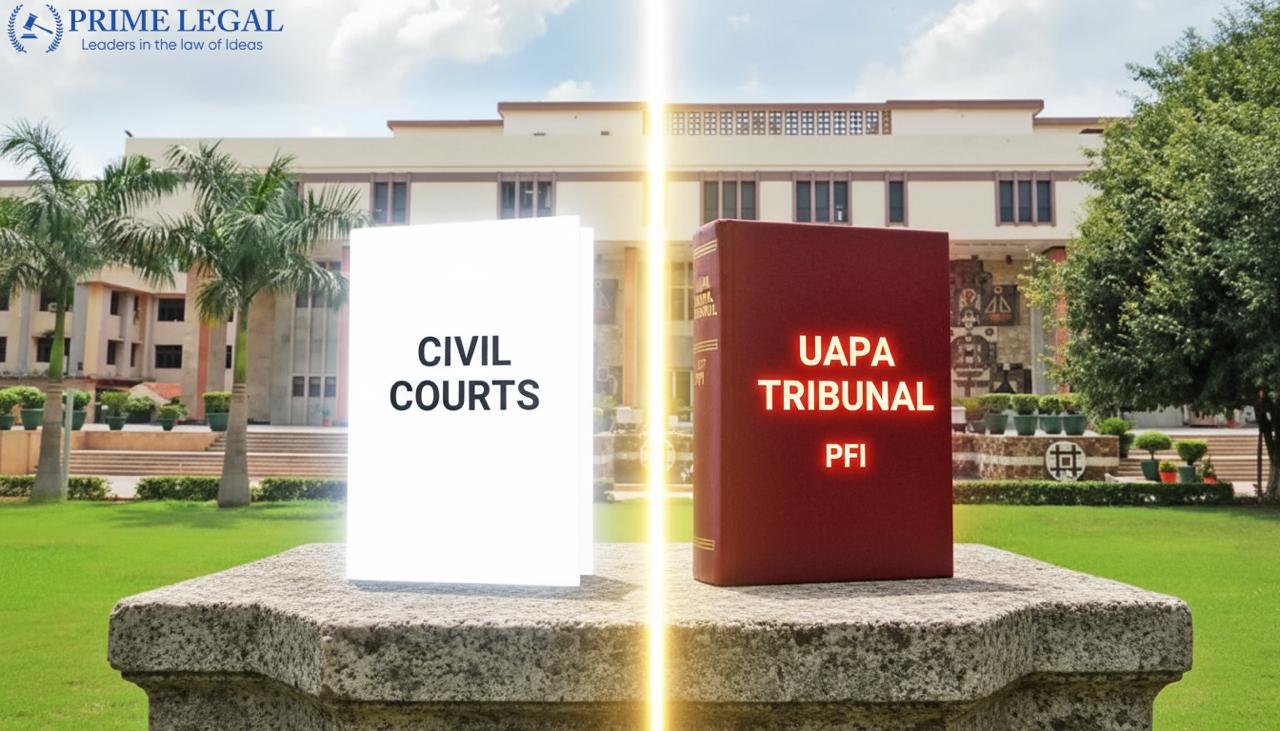Introduction
The Delhi High Court noted that the Unlawful Activities (Prevention) Tribunal operates differently from a regular civil court in a notice in a petition filed by the Popular Front of India (PFI) contesting the Central Government’s decision to ban the organization under the Unlawful Activities (Prevention) Act (UAPA). Chief Justice Devendra Kumar Upadhyaya and Justice Tushar Rao Gedela made up the Division Bench that heard the case. Under Article 226 of the Constitution, PFI had petitioned the Court to overturn the Tribunal’s ruling confirming the government’s designation of PFI and its affiliates as “unlawful groups” in accordance with Section 3(1) of the UAPA. The Bench explained during the hearing that although the Tribunal has adjudicatory authority, its major purpose differs from that of a civil court; it primarily determines whether to uphold the government’s notification that an association is illegal.
Background
Under Section 3(1) of the UAP, the Ministry of Home Affairs had banned PFI and associated organizations previously. After determining whether there was “sufficient cause” for the declaration, the UAPA Tribunal, which was established under Section 5 of the Act, subsequently upheld this decision. Disappointed with the Tribunal’s ruling, PFI first filed an Article 136 appeal with the Supreme Court. The Supreme Court, however, declined to consider the plea and suggested that the petitioners first file a case in the High Court within its writ jurisdiction. In light of this, PFI submitted the current writ case to the Delhi High Court. The Central Government that was represented by Additional Solicitor General S.V. Raju, contested the maintainability of the petition, claiming that because the Tribunal is chaired by a sitting High Court judge and has certain civil court authority, it is comparable to a civil court. Advocate Satyakam, the PFI’s attorney, refuted this claim by pointing to a previous Division Bench decision from the same court.
Keypoints
Structure of the UAPA: The structure of the UAPA was closely examined by the High Court. The High Court said the tribunal’s ruling is final under Section 9 and that a government announcement that declares an association illegal only becomes effective after it is being verified by the tribunal under Section 4. However, the Court made it clear that the Tribunal does not decide private matters like a civil court does; rather, its function is restricted to determining whether “sufficient cause” exists to support the prohibition. The Bench clarified that the Tribunal’s actions are only regarded as “judicial proceedings” for certain purposes under the Code of Criminal Procedure (Section 195 and Chapter XXVI) and for some portions of the Indian Penal
Maintainability of the Petition: The Court further ruled that since contesting the Tribunal’s confirmation inevitably contests the government’s original declaration under Section 3(1), a writ petition under Article 226 is in fact maintainable against the Tribunal’s order. The Bench reasoned that permitting a writ against the government’s action but not against the Tribunal’s confirming order would be “anomalous.” The Court also cited the Supreme Court’s previous ruling that PFI ought to have petitioned the High Court first, a ruling that the Bench said amply supported the current writ’s maintainability. The judges made a differentiation between Articles 226 and 227. They stated that although the High Court may have its power to exercise its writ Jurisdiction, it is not permitted to exercise the supervisory powers over another tribunal. Under Article 227. This is because of the High Court’s administrative oversight. Functions. Independently from the tribunal’s functions.
Recent developments
In Telangana, a High Court recently dismissed a criminal appeal by three accused in a PFI terror-module case who had challenged the sanction for prosecution under UAPA. The HC upheld the trial court’s sanction order as valid.
Conclusion
In conclusion, the Delhi High Court ruled that the UAPA Tribunal serves in a restricted capacity to uphold the Central Government’s judgment under Section 3(1) rather than carrying out the duties of a civil court. The Court decided that although its orders are not subject to the High Court’s supervisory authority under Article 227, they may be reviewed through a writ petition under Article 226. As a result, the Bench determined that the writ petition may be maintained, sent notice to the Union of India, and gave them two weeks to respond and six weeks to submit a counter-affidavit. A follow-up hearing has been scheduled on January 20, 2026.
“PRIME LEGAL is a full-service law firm that has won a National Award and has more than 20 years of experience in an array of sectors and practice areas. Prime legal falls into the category of best law firm, best lawyer, best family lawyer, best divorce lawyer, best divorce law firm, best criminal lawyer, best criminal law firm, best consumer lawyer, best civil lawyer.”
WRITTEN BY: Kaviya Sri


